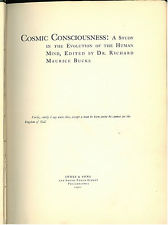Cosmic Consciousness
Cosmic Consciousness is a term used to describe a state of awareness purportedly characterized by a heightened sense of the universe and one's place within it. This concept is often associated with mysticism, spirituality, and psychology. It suggests an expansion of the mind beyond the individual self to encompass a broader, more universal perspective.
Origins and Development[edit | edit source]
The term "Cosmic Consciousness" was popularized by the Canadian psychiatrist Richard Maurice Bucke in his 1901 book Cosmic Consciousness: A Study in the Evolution of the Human Mind. Bucke's work was influenced by his own mystical experiences and his studies of historical figures who he believed had achieved this elevated state of consciousness, including Buddha, Jesus Christ, and Walt Whitman.
Characteristics[edit | edit source]
According to Bucke, Cosmic Consciousness is marked by several key characteristics:
- A sense of unity with the universe
- A profound sense of peace and joy
- An enhanced perception of reality
- A feeling of immortality or eternal life
- A sense of moral elevation and a desire to help others
Related Concepts[edit | edit source]
Cosmic Consciousness is often compared to other spiritual and psychological concepts such as:
Modern Interpretations[edit | edit source]
In contemporary discussions, Cosmic Consciousness is sometimes linked to the idea of a global consciousness or the noosphere, a term coined by Pierre Teilhard de Chardin to describe the sphere of human thought. It is also explored in the context of quantum physics and the interconnectedness of all things.
Practices and Techniques[edit | edit source]
Various practices are believed to facilitate the attainment of Cosmic Consciousness, including:
Criticisms and Controversies[edit | edit source]
While many people report profound experiences of Cosmic Consciousness, the concept is not without its critics. Some argue that it lacks empirical evidence and is too subjective to be scientifically validated. Others see it as a form of spiritual bypassing, where individuals use spiritual practices to avoid dealing with personal or psychological issues.
See Also[edit | edit source]
References[edit | edit source]
External Links[edit | edit source]
Lua error in mw.title.lua at line 318: bad argument #2 to 'title.new' (unrecognized namespace name 'Portal').
Navigation: Wellness - Encyclopedia - Health topics - Disease Index - Drugs - World Directory - Gray's Anatomy - Keto diet - Recipes
Search WikiMD
Ad.Tired of being Overweight? Try W8MD's physician weight loss program.
Semaglutide (Ozempic / Wegovy and Tirzepatide (Mounjaro / Zepbound) available.
Advertise on WikiMD
WikiMD is not a substitute for professional medical advice. See full disclaimer.
Credits:Most images are courtesy of Wikimedia commons, and templates Wikipedia, licensed under CC BY SA or similar.Contributors: Prab R. Tumpati, MD

